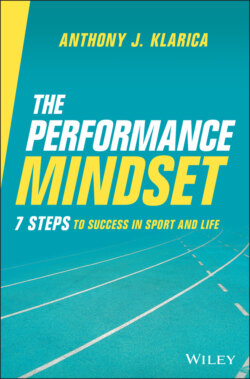Читать книгу The Performance Mindset - Anthony J. Klarica - Страница 22
Enjoyment matters
ОглавлениеConsider what keeps a person highly engaged long enough to maximise the foundation of physical conditioning and skill they have laid in their sport. You cannot become an athlete without dedicated hours of purposeful training and time‐on‐task. If an athlete over time is not enjoying what they are doing, it is unlikely they will train often and hard enough, or with enough engagement and intent, to realise their talent. This applies to all ages but is particularly relevant for younger athletes during their development or transition years from junior to open sport. There are many competing interests for young people so enjoying what they do from an early age is paramount. It is also relevant to more mature athletes, because the level of competition in most arenas is competitive enough that once practice, attitude or mindset slides, performance will give, regardless of talent, even for experienced performers.
In Search of Greatness, an insightful sports documentary by Gabe Polsky released in 2018, features a host of sporting legends including basketballer Michael Jordan, Brazilian soccer star Pelé, Canadian NHL ice‐hockey star Wayne Gretzky, tennis player Serena Williams and San Francisco 49ers NFL player Jerry Rice, often cited as the best wide receiver there ever was. Interviews with each of the athletes provide telling insights into their development and performance.8
Rice insists he didn't feel he had any genetic advantage and was not the most talented receiver, size‐ or speed‐wise, but ‘I knew I had football speed’. His mother wasn't a fan of the game, thinking it too rough. Acknowledging his challenges, however, he explained that ‘what enabled [my] performance was that I worked on certain qualities that I was lacking to make up for my deficiencies’.
Gretsky also recognised early that ‘speed and power was not going to get me to the next level. My wisdom and vision on the ice [got me to the next level]’. Such was his enjoyment of the game of ice‐hockey that from an early age, as he watched games, he would trace the line of the puck on a sketch he had made of the ice‐rink. He also practised regularly on his own. ‘No‐one told me to do it,’ he added.
For both Rice and Gretsky, enjoyment of their sport was integral to their development. This enjoyment drove them to practise alone or play active unstructured games with friends, related or unrelated to their sport. It also developed creativity in how they saw the game and contributed to feeding a strong intrinsic passion to improve.
I have found this passion in many athletes I have worked with over the years. The reasons for their enjoyment varies, from being outdoors to expressing themselves physically, being in a team environment, trying to master a skill or trying to achieve something. A key, consistent factor is that enjoyment is in some way related to their chosen sport, which drives their engagement and time‐on‐task. For this reason, I ask athletes I work with to identify and list what they enjoy and to regularly revisit and update their notes.
